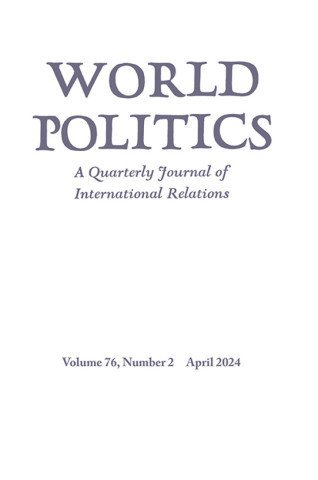政府支出与投票行为
IF 2.5
1区 社会学
Q1 INTERNATIONAL RELATIONS
引用次数: 0
摘要
摘要:政府在公共产品上的支出是否会影响公民的投票选择?一方面,先前的研究将选民定性为财政保守派,当政府支出增加时,他们可能会转向保守政党。另一方面,支出增加可能预示着经济形势良好,从而使进步政党成为更可行的选择。为了在这两种假设之间做出判断,本文借鉴了一个自然实验,该实验创造了政府支出的外生变化。2011 年德国人口普查的不连续性意味着一些城市的预算出现了意料之外的增长。作者利用回归非连续性设计表明,预算的增加以及随后的公共产品支出有利于左翼政党,但对现任政党的支持率却没有明显影响。为了找出因果渠道,作者利用面板证据证明,与未受影响的居民相比,受影响的居民对其经济状况的看法更为乐观,这导致前者支持进步政党。本文章由计算机程序翻译,如有差异,请以英文原文为准。
Government Spending and Voting Behavior
abstract: Does government spending on public goods affect the vote choice of citizens? On one hand, prior research has characterized voters as fiscal conservatives who may turn toward conservative parties when government spending goes up. On the other hand, increased spending may signal that the economy is doing well, which makes progressive parties a more viable option. To adjudicate between both hypotheses, this article draws on a natural experiment, which created exogenous variation in government spending. A discontinuity in the 2011 German census meant that some municipalities saw an unforeseen increase in budgets. Using a regression discontinuity design, the authors show that the increase in budgets and subsequent spending on public goods benefited left-leaning parties but had no detectable effect on incumbent support. To parse out the causal channel, the authors rely on panel evidence and demonstrate that treated residents viewed their economic situation more favorably than did untreated residents, which led the former to espouse progressive parties.
求助全文
通过发布文献求助,成功后即可免费获取论文全文。
去求助
来源期刊

World Politics
Multiple-
CiteScore
8.40
自引率
0.00%
发文量
24
期刊介绍:
World Politics, founded in 1948, is an internationally renowned quarterly journal of political science published in both print and online versions. Open to contributions by scholars, World Politics invites submission of research articles that make theoretical and empirical contributions to the literature, review articles, and research notes bearing on problems in international relations and comparative politics. The journal does not publish articles on current affairs, policy pieces, or narratives of a journalistic nature. Articles submitted for consideration are unsolicited, except for review articles, which are usually commissioned. Published for the Princeton Institute for International and Regional Affairs
 求助内容:
求助内容: 应助结果提醒方式:
应助结果提醒方式:


